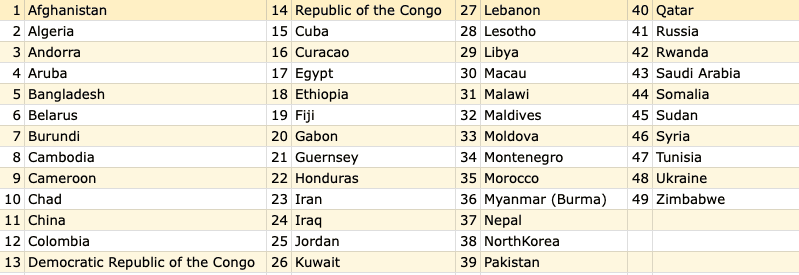In Brief
- FTX repayment freeze halts crypto distributions to 49 jurisdictions, including 16 African countries, due to restrictive digital asset regulations.
- African creditors in banned regions (e.g., Algeria, Burundi) face indefinite delays or permanent loss of funds, with 45-day legal challenges requiring resources most lack.
- The freeze underscores Africa’s fragmented crypto regulations, where bans and undefined policies exclude users from global restitution processes.
Regulation has recently been the main focal point for Africa’s crypto ecosystems. However, it might be a little too late for African FTX victims.
A sweeping FTX repayment freeze has rocked the ecosystem, with its distributors blocking access to individuals and entities in 49 specific jurisdictions globally.
This list includes some of Africa’s growing crypto communities in regions like Egypt, Zimbabwe, and Algeria, among others.
This freeze, requested by the FTX Recovery Trust and awaiting court approval, stems directly from the complex and often restrictive regulatory landscape governing digital assets within these countries.
The catastrophic 2022 crypto crash scarred many upcoming traders, and the reimbursements were something that may awaited.
The Mechanics of the Freeze: Legal Caution Trump Creditor Rights
On July 2, 2025, the FTX Recovery Trust filed a motion in the Delaware bankruptcy court seeking legal authority to halt repayments to creditors residing in the listed 49 jurisdictions.
The main cause? Fear of legal repercussions from local jurisdictions.
The Trust gave a solid argument stating that distributing funds, whether in crypto or fiat, into regions with outright bans or murky regulations on digital assets could expose its directors and officers to severe penalties.
CHECK OUT:Solving Cross-Border Transactions: Conduit’s Stablecoin Model for Global Business Payments
This could include hefty fines and even criminal prosecution or imprisonment, and FTX has had its fill of legal matters since the 2022 crypto crash.
“Distributions made by or on behalf of the FTX Recovery Trust into jurisdictions in violation of these legal restrictions may trigger fines and penalties, including personal liability for directors and officers, and/or criminal penalties up to and including imprisonment.”
Amid the 49 is China, which accounted for a staggering 82% of the frozen claim value, causing an uproar from most of the victims.
Despite Africa only accounting for 5% of the total claims, those caught under this net will unfortunately face a path full of uncertainty and complex hurdles,
Africa’s Regulatory Patchwork: A Self-Imposed Barrier
The FTX repayment freeze highlights a harsh reality: the regulatory environment within many African nations is still not as progressive as we all hoped for.
Nations like Algeria, Burundi, Libya and Malawi have outright banned the use of cryptocurrency.
Despite each nation having an active crypto community, its nations are still warry concerning the ramifications of digital assets.
Additionally, a neutral or undefined stance on crypto didn’t give a semi-green light for reimbursement, with regions like Cameroon still having no say on the matter.

The list of potentially restricted jurisdictions is mentioned in FTX’s court motion on July 2, 2025. [Photo:Koll]
Out of the 49 countries, 16 African countries are cited, each having a common factor: either negative crypto regulations, a neutral stance on digital assets or are currently drafting a crypto regulation.
The latter, despite foreshadowing future adoption, is plagued by consistent rework and revising, causing some drafts to take several years before actually launching.
The Crushing Impact on African Creditors
For affected African users, the FTX repayment freeze translates into several grim possibilities:
- Indefinite Delays: Repayments are on hold until local legal counsel can confirm compliance with local laws – a process with no guaranteed timeline or outcome. For jurisdictions with outright bans, clearance seems unlikely.
- Complex Legal Hurdles: Creditors may attempt to contest the freeze by filing sworn declarations within a strict 45-day window and accepting U.S. court jurisdiction. This requires resources, legal understanding, and swift action, which many retail users lack. In truth, it locks most retailers and individuals out of the reimbursement.
- Permanent Loss: In the worst-case scenario, especially in jurisdictions like Algeria and Burundi, where regulatory change seems distant, frozen claims could ultimately be forfeited, with funds reverting to the Trust, permanently denying users their rightful assets.
- Frustration with FTX Claim Status: Checking one’s FTX claim status now brings devastating news for those in frozen regions, moving from anticipation of recovery to the reality of exclusion due to their location’s regulations. The promised transparency of the bankruptcy process feels hollow.
A Stark Lesson in Regulatory Realities
Aside from the legal aspect, barricading access also complicates its practices. FTX, via Payoneer, BitGo and Kraken, expanded its distribution channels to 93 countries.
However, key African markets are still left outside the loop. Currently, Africa’s fragmented regulatory frameworks impede the use of digital wallets or crypto exchanges necessary to receive funds.
CHECK OUT:Coinbase Data Breach and SEC Investigation Trigger 7% Stock Drop Amid Growing Security Concerns
As a result, the frozen crypto assets will effectively go back to FTX.
This is practically good news for the bankrupt crypto exchange, while for most traders who heavily invested in FTX, it’s a prolonged nightmare.
The FTX credit updates within the aforementioned jurisdictions are most likely to give up on the notion.
The objection process is low, uncertain and marred by local and international legal differences.
The FTX repayment freeze exposes the critical vulnerability contributing to the slow adoption of digital assets.
The concept goes beyond just providing alternative sources of income; it redefines payments.
This situation underscores an urgent need for clearer, more pragmatic regulatory frameworks that protect consumers without completely isolating them from global financial processes and restitution mechanisms when things go wrong.


1 comment
[…] CHECK OUT: FTX Repayment Freeze: How Regulatory Gaps Lock Africa Out of Crypto Reimbursement […]